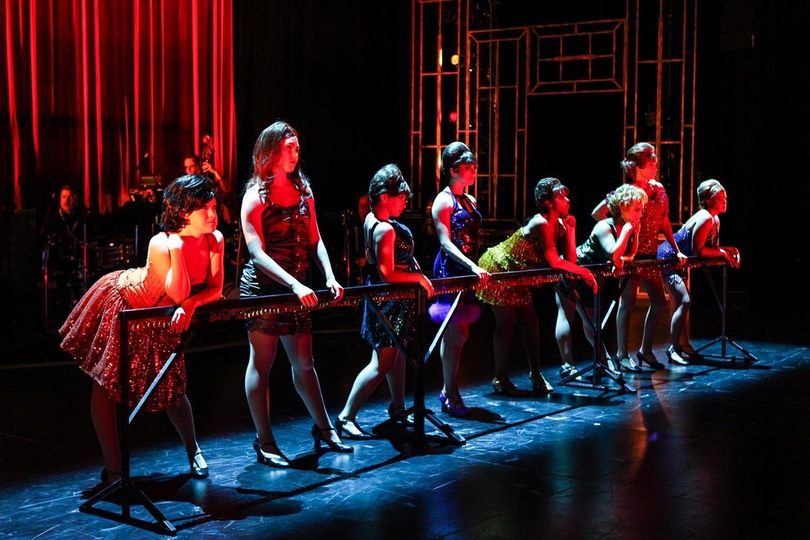VPA students put on “Sweet Charity” at Syracuse Stage

Courtesy of Mike Davis
Preparations and rehearsals started months ago for students performing and working on the musical “Sweet Charity.”
To support student journalism and the content you love, become a member of The Daily Orange today.
Clarification: A previous version of this post stated that “Sweet Charity” was by Syracuse Stage. While hosted at Syracuse Stage, the play was by the Department of Drama at Syracuse University. A previous version of this post also stated that Lloyd Culbreath choreographed for “Sweet Charity.” Kira Schmidt-Carper was the choreographer for the show, and Culbreath was a guest choreographer for one song.
Love is the root of many entertainment stories, and the play “Sweet Charity,” SU’s Department of Drama’s latest performance, is no exception.
“(The play was) a sweet story of a quirky young woman trying to find love…leading mistakenly or purposefully into a journey of self discovery,” said Celia Salita, one of the audience members and a freshman at Syracuse University.
SU’s Visual and Performing Arts students opened the play, written by Neil Simon in 1966, to the public Oct. 15 at Syracuse Stage, and it closed its curtains Sunday. David Lowenstein directed the show, which had over a two hour run time and only an 18-member cast.
The curtains opened to a musical number that concluded with the protagonist, Charity, played by Katarina Kelly, holding a suitcase that read, “The story of a girl who wants, more than anything, to be loved.” But by the show’s conclusion, Charity realizes the only person who she truly needs is herself, and embarks on a journey of self discovery.
(It's) The story of finding your way, finding your journey, and standing up for yourselfLlian Benge, Assistant costume designer and sophomore theater design major
Though many of the performers played more than one role throughout the show, Salita said this didn’t hurt the actors’ abilities to develop their characters. Instead, it allowed them to experiment with several characters, which doesn’t always happen in the theater.
“I think every actor and actress was very well cast,” Salita said. “I felt like each person had a very thoroughly developed character and loved that they all got to portray many different roles throughout the show.”
The VPA program often invites industry professionals to be on the creative team and work with students throughout its shows. Guest choreographer Lloyd Culbreath, who has been in the industry for 30 years and is currently an instructor at the Broadway Dance Center, worked on a song with the students in “Sweet Charity.”
Among other Broadway appearances, Culbreath was also in the cast of a national tour of “Sweet Charity,” and is a veteran in Fosse-style choreography, a form of hyper-stylized jazz dance. Bob Fosse, who conceived, directed and choreographed the original Broadway production of “Sweet Charity” in 1966, coined the style.
Coming from Broadway and the world of professional theater, Culbreath said he treated the students the same way he would industry professionals, and was impressed with their professionalism in the rehearsal room. He said while the play is intense, the production never has a dull moment.

Courtesy of Mike Davis
“There is just such an optimistic feeling of hope in the show Sweet Charity, and there’s something so endearing and just so bubbly 60’s — fun and sweet — it’s just that kind of a show,” Culbreath said. “When you have performers of a certain level, that can really bring life to the show and understand the comedy.”
While the students onstage have been preparing for months, the crew was hard at work as well. They heavily researched details, like the show’s costumes, to accurately depict the time period. Lillian Benge, an assistant costume designer and sophomore theater design major, said the team began researching March, but that it was not a smooth process.
The show was originally supposed to be “Chicago,” another Fosse musical that opened on Broadway in 1975, so the design process started much later than usual.
“I think we did a fantastic job with the time crunch, and it encouraged us to spend a lot of long nights together just sitting and designing and doing research,” Benge said.
Still, Benge said the costume design team effectively transported the audience to the 1960s, and the musical’s message still rang true.
“(It’s a) story of finding your way, finding your journey, and standing up for yourself, ” Benge said.





